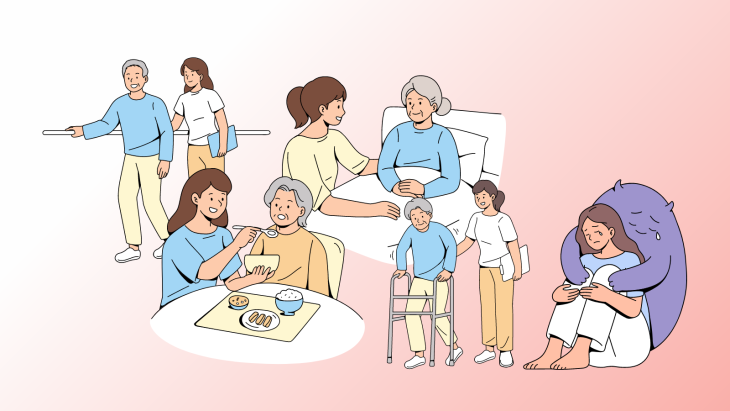Recent Posts
- The Anxious Generation. What is causing Gen Z's mental health crisis?
- Do you have to play games to make relationships work?
- Can a Therapist Find love? The Dating Life of a Therapist.
- Can a Therapist Benefit from Therapy?
- My kid's schedule is fully packed with after-school activities everyday. How much is too much?
Most Popular
I am a caregiver to my chronically-ill family member and the stress is getting to me! How can I serve them well, and still care for my mental health?

An ill family member depends on you to do multiple and sometimes complex tasks, because it is difficult and too expensive to get home-care providers, and you also want to show your care and support for that sick family member. So you may run errands, transport them to and from their doctor consults, prepare meals, give them some of their medicine, monitor and make sure they are safe, and even sometimes manage difficult behaviors.
You have been a carer for several months now, and you are starting to feel symptoms of anxiety, and a weakened immune system. It might be a bit embarrassing to say, but you are losing satisfaction of being a carer. At times, you feel helpless and isolated. It’s just incredibly exhausting.
You are not alone.
In 2016, in a report by the Academies about families caring for America’s aging population, caregivers to family members have reached about 18 million and this number is estimated to rise to 30 million by 2050.
The role of caregivers have become more challenging in recent years because life expectancy in the US is increasing, while many in the population get sick early with chronic diseases, while hospital days have incredibly shortened, and sick patients are expected to continue their recovery at home with the assistance of a carer.
Whether you have been a carer for only a limited time, or a possible life-long caregiver, and the degree of your tasks may vary over a period of time, providing unpaid care to a family member with reduced physical, mental, and/or cognitive abilities can be stressful to you. Addressing the stress is crucial in order for it not to become chronic stress and you can still care for your own physical, mental and emotional health.
The rewards of caregiving
You may feel a roller coaster of emotions in your caregiving, because many of the things such as financial strain, feelings of loss or grief from unpredictable health outcomes, conflicts in relationships, decrease in the quality of your lifestyle and health, etc.
On the other hand, there are rewards to the service you give. The National Opinion Research surveyed caregivers and they reported positive outcomes for caregivers and their families. Caregivers said that they also enjoy stronger relationships and commitments to the family, pride and satisfaction, problem-solving skills, and personal growth. Other outcomes were finding their purpose in life, and improvement in their empathy and compassion.
How can I manage my caregiver stress?
You can employ some practical tips to decrease your stress.
- Improve your self-care practices.
Surveys have shown that it is common for caregivers to neglect their own health. They miss their own doctor appointments, either skip meals or eat a poor diet, don’t get enough sleep, are more prone to abuse the use of alcohol, or smoke.
It puts caregivers at more risk for both physical and psychological problems such as chronic diseases, anxiety, depression and isolation.
You have heard that “We cannot pour from an empty cup” or we cannot take care of others unless we take care of ourselves first. So including simple and healthy lifestyle habits in your schedule is important to reduce your risk for dangers. Engage in leisurely activities once or twice a week too!
- Know more about your situation and equip yourself.
Assess your well-being and know more about the issues you are facing as a caregiver. When you increase your awareness of specific issues like the health challenges, financial challenges you face and the support needed for them, you can make better decisions. It can decrease your hopelessness and increase the clarity of your purpose.
- Work with the support of a community.
One challenge in caregiving is the feeling of being isolated. But try communicating your concerns and needs with people who might point you to support groups and associations that help caregivers. Whether you meet with other caregivers face to face, or through online channels, or you involve other family members to do some of the responsibilities, you still get assistance that can make your work lighter.
Also, consider the help of a family counselor or a social worker to help you and your family figure out how you can work with and support one another.
You are human and you also need to mind your own well-being so that you become a more effective and loving caregiver. With intentional healthy self-care practices, awareness about specific issues and a supportive community, you can find a balance between your responsibilities and personal life.
Browse through hundreds of healthcare jobs across the US and find the career path that suits your skills and preferences!








Comments